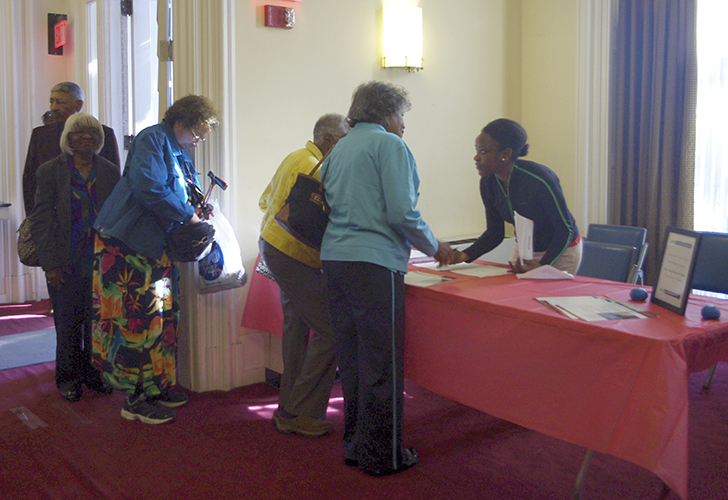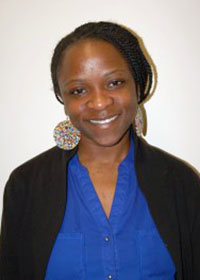
Angela Ddamba, right, signs in guests in 2014 at “Forget Me Not,” a play about Alzheimer’s disease among African-Americans, held at Freedom Theater.
Angela Ddamba joined the Penn Memory Center as a volunteer on a mission; she wanted to increase African-American participation in research. She completed her time here confident that equity in healthcare is within reach.
In her own words, here is her story:
Before I began volunteering with the Penn Memory Center (PMC), I had not been exposed to elder care in the community. This experience allowed me to work with the older, mainly African-American population in Philadelphia. I worked with Coordinator for Diversity in Research and Education Tigist Hailu, mainly to help with enrollment of African-American participants into NACC, a nationwide study of Alzheimer’s disease.
Alzheimer’s disease affects African-Americans at twice the rate of their white counterparts, for a number of reasons. It is necessary to increase the number of African-American research participants to gain a deeper understanding of this divide. This is where most of my learning began.
Although I was aware of the infamous Tuskegee experiments, it was not until I reviewed focus group notes on what factors influenced African-Americans’ decisions to enroll in research studies that I realized the far-reaching effect of such histories. An undercurrent in the discussions in the focus groups was a general mistrust of the medical community, because of beliefs that ill treatment would occur. Others were just not sure how to communicate with physicians. I was becoming acquainted with entrenched beliefs formed through years of unequal treatment in the American medical system, and I began to realize the urgency of improving the healthcare system to pointedly improve conditions surrounding healthcare for underserved minorities.
My time at PMC cemented in me the belief that equal access to healthcare, regardless of skin color, must start before birth. The path to equity in healthcare will be long, but experiences such as the one I had at PMC bring the importance of contributing to ensuring this equity.
Through participation in community events focused on cognitive health, I engaged with members of the community, particularly senior African-Americans. The sense of community, especially through churches, was evident. However, many senior African-Americans said they did not feel safe in their neighborhood or did not feel that they had adequate mobility within their communities, factors that negatively affect cognition. Therefore, I also learned through my experience in these communities of the general need for resources in underserved communities
 Overall, my experience volunteering at PMC illustrated the need for a multipronged approach to solving health inequities present in the American system that keep on manifesting, even into old age with regard to brain health. I believe it can be done, and I am very grateful for the opportunity to work closely with Tigist Hailu on the important work she is doing at the PMC to improve brain health for underserved communities. From such foundations will we be able to experience a healthy country for all.
Overall, my experience volunteering at PMC illustrated the need for a multipronged approach to solving health inequities present in the American system that keep on manifesting, even into old age with regard to brain health. I believe it can be done, and I am very grateful for the opportunity to work closely with Tigist Hailu on the important work she is doing at the PMC to improve brain health for underserved communities. From such foundations will we be able to experience a healthy country for all.
-Angela Ddamba
PMC Volunteer, January 2014 – August 2015